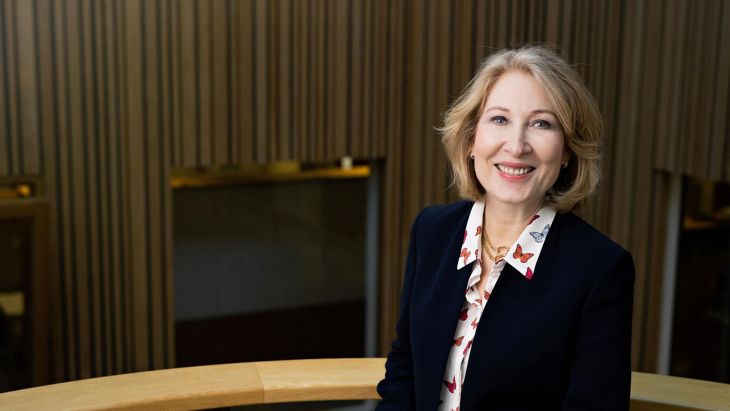Your combination of clinical practice and research interests must make you pretty unique? Everybody told me that I couldn't possibly train as a psychiatrist and set up my own lab at the same time.
I ignored them and started to research post-mortem brains of people with different psychiatric disorders. At the time, I was also doing 56 hours of clinical work a week, including a night on call. It was a very busy time but I had a lot of support from the head of department who gave me one day a week to focus on my research.
The Stanley Institute continued to fund my research on post-mortem brains. But after a couple of years, they said: "Sabine, it's nice that you are doing this work and you are coming up with lots of interesting findings, but we would prefer it if you could research something which is more directly relevant to helping patients."
From my clinical work, I could see how long it was taking for patients to get a diagnosis, something that is still largely arrived at by asking questions. Psychiatric evaluation is not an objective process and it can take a very long time for people to get the right diagnosis. I wanted to look for biological evidence of brain abnormalities which could provide an instant answer and get patients on the right pathway straightaway.
We found changes in the cerebral spinal fluid, and based on these findings I was funded to look for biomarkers for certain psychiatric conditions - particularly schizophrenia - with the hope of being able to develop early diagnostic tests.
When did you start to think about founding a company? I began to explore the idea when we started to get positive results. I talked to Cambridge Enterprise but didn't have any business experience and no real idea of how to go about it.
At around the same time, I made the decision to move my lab from Babraham and, with the support of the University, moved into what was then the Institute of Biotechnology (which has since merged with the Department of Chemical Engineering).
It was there I met Professor Chris Lowe who has been the driving force behind many Cambridge spinouts. He became the co-founder of Psynova and more or less took me by the hand and put me in touch with all the right people.
We got some grant money from the University to undertake a proof of concept study, followed by seed funding and then venture capital. And within five years we had some nice results.
Eventually we were acquired by Myriad Genetics, a NASDAQ-listed company. We did release a diagnostic blood test for schizophrenia, but unfortunately it has not survived into wider clinical application.
So it was a success in terms of entrepreneurship and having an exit, but it was a big disappointment that we weren't able to develop something which ultimately helps patients.
But you didn't give up on the idea? No. I began to think about the limitations of the Psynova approach. The blood had to be collected from the vein, spun down and then shipped on dry ice. This cost a lot of money and the platform that we used was also very expensive. So each test cost $2,600 which is just too much to roll out widely for any healthcare provider - even a private one.
I wondered, instead, if it would be possible to identify biomarkers in dried blood spots which could be collected by the patients themselves and mailed in an envelope.
I went to see Cambridge Enterprise again and asked if they thought it would be worth starting another company to develop this new technology. They did.
However, the problem with biomarkers is even if they are highly sensitive, they produce high false positive and negative rates. But if you enrich that data with symptoms, you will get much more accurate results.
In conjunction with the dried bloodspots, therefore, we developed a digital platform which emulated a full psychiatric assessment, asking patients about their psychiatric history and personal circumstances.
Cambridge Enterprise gave us some seed funding to support a large-scale trial in collaboration with my lab. 1,300 people sent us their dried blood spots and completed the online assessment.
The results took us completely by surprise: the digital platform significantly outperformed the biomarkers. We decided to pivot and focus on the digital diagnosis instead.
Then COVID came along and our plans were delayed by a year to 18 months. But we are very fortunate that our investors have stood by us. They understood that we were operating in difficult circumstances and gave us more money and new investors came on board.
Where is Pysomics now? We have launched our digital diagnostic platform, called Censeo. It is currently being used in two NHS trusts and we have our first paying customer - which is a major milestone.







